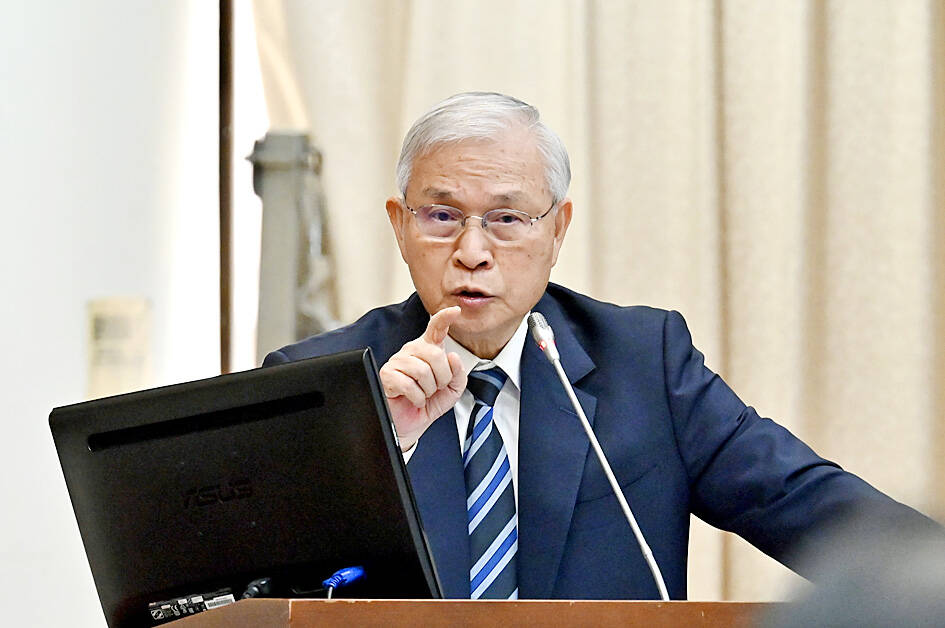The central bank yesterday called on local financial institutions to strictly adhere to foreign exchange rules and ensure that foreign capital inflows align with their declared purposes to help maintain stability in the foreign exchange market.
The call came after the local currency appreciated more than 10 percent earlier this month, raising concern that local exporters and life insurers would face substantial profit erosion.
The top monetary policymaker said it found that some foreign funds, intended for investment in Taiwan’s securities market, are parked in New Taiwan dollar-based demand accounts instead.

Photo: George Tsorng, Taipei Times
Central bank Governor Yang Chin-long (楊金龍) earlier partly blamed market speculation for facilitating the rise in the NT dollar against the greenback and said that the trend has nothing to do with Taiwan-US trade talks.
Further investigation revealed that some companies and individuals had converted foreign loans into the local currency without clear or legitimate use, moves that could add volatility to the local currency market, the central bank said, after pledging to take action against currency speculators.
The central bank reiterated the importance of compliance with foreign exchange rules for all transactions and that financial institutions should help monitor irregular activity.
Commercial banks should check the “real need” principle when processing foreign currency loans and NT dollar forward foreign exchange contracts, it said, adding that this requires verifying the necessity and legitimacy of each transaction.
For large-scale NT dollar conversions, banks must ensure that supporting documents match the declared purpose of the transaction, it said.

Taiwan’s rapidly aging population is fueling a sharp increase in homes occupied solely by elderly people, a trend that is reshaping the nation’s housing market and social fabric, real-estate brokers said yesterday. About 850,000 residences were occupied by elderly people in the first quarter, including 655,000 that housed only one resident, the Ministry of the Interior said. The figures have nearly doubled from a decade earlier, Great Home Realty Co (大家房屋) said, as people aged 65 and older now make up 20.8 percent of the population. “The so-called silver tsunami represents more than just a demographic shift — it could fundamentally redefine the

The US government on Wednesday sanctioned more than two dozen companies in China, Turkey and the United Arab Emirates, including offshoots of a US chip firm, accusing the businesses of providing illicit support to Iran’s military or proxies. The US Department of Commerce included two subsidiaries of US-based chip distributor Arrow Electronics Inc (艾睿電子) on its so-called entity list published on the federal register for facilitating purchases by Iran’s proxies of US tech. Arrow spokesman John Hourigan said that the subsidiaries have been operating in full compliance with US export control regulations and his company is discussing with the US Bureau of

Businesses across the global semiconductor supply chain are bracing themselves for disruptions from an escalating trade war, after China imposed curbs on rare earth mineral exports and the US responded with additional tariffs and restrictions on software sales to the Asian nation. China’s restrictions, the most targeted move yet to limit supplies of rare earth materials, represent the first major attempt by Beijing to exercise long-arm jurisdiction over foreign companies to target the semiconductor industry, threatening to stall the chips powering the artificial intelligence (AI) boom. They prompted US President Donald Trump on Friday to announce that he would impose an additional

China Airlines Ltd (CAL, 中華航空) said it expects peak season effects in the fourth quarter to continue to boost demand for passenger flights and cargo services, after reporting its second-highest-ever September sales on Monday. The carrier said it posted NT$15.88 billion (US$517 million) in consolidated sales last month, trailing only September last year’s NT$16.01 billion. Last month, CAL generated NT$8.77 billion from its passenger flights and NT$5.37 billion from cargo services, it said. In the first nine months of this year, the carrier posted NT$154.93 billion in cumulative sales, up 2.62 percent from a year earlier, marking the second-highest level for the January-September